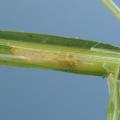Insect Pests of Alfalfa
Very little alfalfa is grown in Mississippi, and we do not maintain insect control recommendations for alfalfa. Producers who are attempting to grow alfalfa in the state may wish to refer to the Alfalfa Insect Management Guide, 2014, from Kansas State University, to learn about potential pests and control options. Be aware, however, that the insect pests that attack alfalfa in Mississippi may differ considerably from that in other states and that insecticides labeled for use in other states may not be labeled for use in Mississippi. For example, products containing chlorpyrifos may not be labeled for use in Mississippi even though they are labeled in other states. Read product labels carefully and verify state registration before treating.
Publications
News
Following last year’s significant fall armyworm outbreak, hay producers should be careful not to overlook another important pest -- the Bermudagrass stem maggot -- while watching for armyworms. While farm armyworms attack hay fields, home lawns, golf courses and more, the non-native Bermudagrass stem maggot is primarily a pest of hay fields.
Lawns, pastures and even winter food plots are at risk as an insect army advances across much of the state in higher than normal numbers. Blake Layton, entomologist with the Mississippi State University Extension Service, said fall armyworms are the most damaging insect pests of bermudagrass hayfields and pastures
Every year, lawns and pastures become targets for late-summer grass-eating caterpillars, making it important to watch for the usual suspects and some culprits that are less common.




